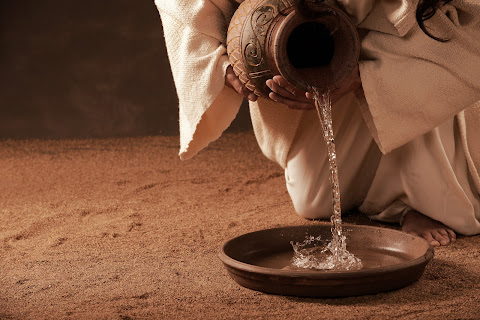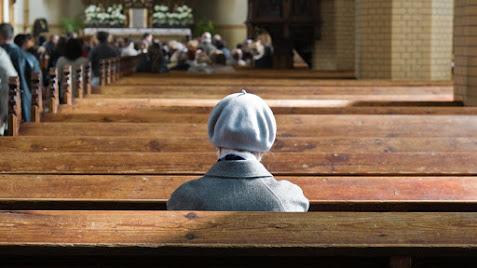At the dawn of the fledgling Jesus movement, there was a moment when Christianity could easily have been crushed out of existence. Its adherents may have been passionate, but they were a handful in number. In that vulnerable moment, the leaders of the movement found themselves imprisoned by the theocratic authorities in Judah. Their lives were in peril.
In that moment, or so the Acts of the Apostles tells it, a rabbi stepped in and saved them. Gamaliel was a spiritual teacher of considerable substance, remembered not just in the narratives of Christian faith, but also in the story of modern Judaism. He was of the lineage of Rabbi Hillel, the open-hearted, gracious teacher whose thoughtfulness, and liberality still speaks to much of contemporary Judaism.
When this paltry group of earnest heretics was dragged before the Sanhedrin, passionately refusing to let go of their recently executed teacher, Gamaliel counseled patience. "Look," he said. "If these people are wrong, and an offense to God, they will fail. Their movement will disperse, like those that coalesced around many other bright-eyed would-be messiahs. But if God is with them, then they will succeed. Let them do as they do, let us see what becomes of it, and let God be the judge. They thrive, and it is of God. If they peter out, then they..."
"What?" said Peter.
"It's a figure of speech," Gamaliel smiled, then turned to his fellow rabbis. "Let them try, and we will know them by their fruits." The Sanhedrin, or so the story goes, was persuaded. The church survived.
Gamaliel's measure is a wise one for any new thing. Try it. Keep an open heart, and an open mind. Does it work? Then it's worth doing. It aligns with the reality of God's work in the world. If it fails? Then it does not. You can learn from that failure, and try again in a different way. Or you can abandon that rocky, sun-blasted road to nowhere, and journey instead to more fertile fields.
This is hard for both fools and ideologues, who tend to double down on their folly. But it's both gracious and realistic for the rest of us.
Which brings us to "deconstruction."
Back when I was in seminary...and here we're talking the late 1990s, because I'm old..."deconstruction" was the brightest and shiniest new thing in progressive-leaning seminaries. For the deconstructivist, the great threat to faith is rigidity and calcification. Orthodoxy is inherently oppressive, as it constrains freedom of thought and action. So all assumptions must be both challenged and torn down. Language itself must be torn down, and new language created, which must then be torn down. Derrida and Rorty were quoted, and then deconstructed themselves. By its very nature, deconstruction is nearly impossible to define, as it tries to squirm away from the connection between symbol and referent, between language and reality. Evangelicals uncomfortable with the peculiar rigidities that were forming in their tradition embraced it, but so did many in the oldline denominations.
I was part of the Emergent movement, back when it happened, and deconstruction was part of the postmodern ethos. I blogged, and I jousted with power, so I found myself fellow-travelling with a group called Presbymergent for a while. I gathered in Louisville with earnest Presbyterian progressives, all of whom were eager to subvert the hegemonies, to take the church completely apart so that a new thing could rise. Church...the institution, the structures, the expectations...was hurtful and wrong. Something new was needed. With modernity behind us, all beliefs needed to be critically assessed, and faith itself must be systematically interrogated. We needed to embrace the mystery, and move beyond the prison of old forms and languages.
That was twenty years ago. Listening to the wise and gracious counsel of Rabbi Gamaliel, we can see the results of that intellectual movement. We know the fruits of deconstruction now, and the fruits of deconstruction are...deconstruction.
Every corner of the Christian world that embraced deconstruction is coming apart. Here, I'm not talking about the reduction in numbers that came with the departure of fundamentalists and literalists. I'm talking after that, about the life of the post-departure communities that embraced criticism and deconstruction. Progressive and liberal Christian denominations are decoalescing, evaporating like dew beneath the morning sun.
There's variance in the rate of coming-apart, sure. There are outliers, like Unitarian Universalism, which remains more or less stable. But among the oldline, it's consistent and replicable, the sort of result that marks something.
Critical thinking is all well and good, if it serves a purpose. But tearing down for the sole purpose of tearing down is the opposite of faith. That sort of criticism requires an existential distance between the critic and the thing they are criticizing, a separation of the deconstructor and the construct they are subverting. It requires remove. Abstraction. And a "faith" that is abstracted is not faith.
If we have faith, then that faith defines us. It is a relationship that establishes meaning. It determines and frames our understanding of the good. Wisdom requires us to test that faith, of course, to assess whether or not that faith is true to its purpose. For the Christian, that requires us to trim away that which is hateful, graceless, and unjust. It requires us to have a sense of the life and geist of the Way. For Jesus folk, that's Christ and his teachings.
As a Christian, I do not stand above this, or separate from it. I do not analyze it as an academic, or criticize it as an activist. I strive to live it out.
Though I acknowledge the complex reality of the process by which the Gospels themselves were made, the vagaries of oral and written traditions, the work of editors, the challenges of translation, and the influences of cultural context, that does not change the dynamics of my faith. Jesus is the teacher, and I am the disciple. The Gospel remains the measure against which I determine the value my actions.
If I fail to do this, my faith ceases to be the center around which I integrate my life. That is when faith disintegrates, when I cease to be. It isn't conservative, because it tears down all that comes before. But neither is it progressive, because it is so busy attacking what is that it accomplishes nothing.
There was a moment all those years ago back in Louisville that still sticks with me. We'd spent an entire morning discussing and deconstructing and lamenting, which was occasionally empowering, but often just kinda felt like complaining about church. Finally, finally, we had turned to establishing what we hoped to do. What did it mean to be Presbyterian and Emergent? What was our vision? What was the future we hoped to bring into reality? What values united us in common purpose?
We shared those things together, laying out what it was that we yearned to build. We created a statement that named that thing, one that set us towards a future of the movement within the church. It was a moment of shared dreaming, in which we found our commonalities. It felt, for a brief moment, exciting. Like the stirring of the Spirit, like the beginning of a New Thing.
By the end of that afternoon, we had found a roadmap to Presbymergent's purpose. It was still rough around the edges, but so were we, and that was part of the appeal. We had started to build, to create, to live something new together.
Then one participant announced, seemingly out of nowhere, that this was unacceptable. That it constrained us. That we were building a new orthodoxy. That we couldn't allow ourselves to be confined or defined. We had to tear it down. It must be deconstructed, in this case, quite literally.
"We have to burn this," he said. "Who has a lighter?"
I was aghast, but I was also an outlier. I should have spoken up, but I was an introvert among a group I only kinda sorta knew. So that was what the group did, as I watched. Our efforts were turned to ashes, and the wind carried them away.
It was the moment that Presbymergent failed the Gamaliel test. Well, the first moment. We did a whole bunch wrong after that, too.
But for me, it was a mark of deconstructions' nature, and a warning to those communities that choose to uncritically embrace it. The fruits of unbounded deconstruction are self-annihilation. It is not the friend of newness, or creativity, or faith.























